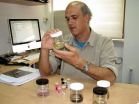Obstructive sleep apnea treatments may reduce depressive symptoms
2014-11-25
(Press-News.org) Treatment for obstructive sleep apnea with continuous positive airway pressure (CPAP) or mandibular advancement devices (MADs) can lead to modest improvements in depressive symptoms, according to a study published by Marcus Povitz, Carmelle Bolo, and colleagues from University of Calgary, Canada, in this week's PLOS Medicine.
The researchers identified 22 randomized controlled trials that investigated the effects of CPAP or MAD treatment on patients with obstructive sleep apnea and that measured depressive symptoms before and after treatment. By pooling the results from the 19 trials examining the effects of CPAP, the researchers observed that CPAP significantly improved depressive symptoms compared to the control intervention (usually sham-CPAP), with a greater improvements in those trials in which there was a higher prevalence of depression at baseline than in trials in which there was a low prevalence of depression at baseline. In a pooled analysis of the five trials that provided information about the effect of MAD on depressive symptoms, they observed that MAD also improved depressive symptoms compared to the control intervention (sham-MAD).
While the findings indicate that CPAP or MAD can lead to modest improvements in depressive symptoms among people with obstructive sleep apnea, they give no indication of the efficacy of CPAP and MAD compared to standard treatments for depression such as anti-depressant medications. Furthermore, the accuracy of the findings may be limited by methodological limitations within the trials included in the meta-analyses and, for the CPAP trials, there was considerable variability between trials.
The authors say: "this systematic review summarizes the available literature on OSA treatment, demonstrating that both CPAP and MAD treatment result in small improvements in depressive symptoms based on questionnaires. Our results illustrate that the greatest benefit of CPAP treatment on depressive symptoms may occur in populations with worse depression scores at baseline."
INFORMATION:
Funding: SJ Heitman is supported by an award from the N.B. Hershfield Professorship in Therapeutic Endoscopy. M Povitz is supported by an award from the Western Regional Training Centre for Health Services Research. The authors received no specific funding for this work.
Competing Interests: The authors have declared that no competing interests exist.
Citation: Povitz M, Bolo CE, Heitman SJ, Tsai WH, Wang J, et al. (2014) Effect of Treatment of Obstructive Sleep Apnea on Depressive Symptoms: Systematic Review and Meta-Analysis. PLoS Med 11(11): e1001762. doi:10.1371/journal.pmed.1001762
Author Affiliations:
University of Calgary, CANADA
Western University, CANADA
Contact:
Matthew James
University of Calgary
CANADA
+1 403 944 3961
mjames@ucalgary.ca
ELSE PRESS RELEASES FROM THIS DATE:
2014-11-25
HOUSTON - (Nov. 25, 2014) - An international collaboration of scientists including Baylor College of Medicine has completed the first genome sequence of a myriapod, Strigamia maritima - a member of a group venomous centipedes that care for their eggs - and uncovered new clues about their biological evolution and unique absence of vision and circadian rhythm.
Over 100 researchers from 12 countries completed the project. They published their work online today in the journal PLOS Biology.
"This is the first myriapod and the last of the four classes of arthropods to have ...
2014-11-25
The arthropods are one of Earth's real success stories, with more species of arthropod than in any other animal phylum, but our knowledge of arthropod genomes has been heavily skewed towards the insects. Recent work has furnished us with the genome sequences of an arachnid and a crustacean, but the myriapods (centipedes and millipedes) have remained the one class of arthropods whose genomes are still in the dark.
An international team of scientists (over 100 from 15 countries) with Stephen Richards (Baylor College of Medicine) as senior author has now sequenced the genome ...
2014-11-25
Centipedes, those many-legged creatures that startle us in our homes and gardens, have been genetically sequenced for the first time. In a new study in the journal PLoS Biology, an international team of over 100 scientists today reveals how this humble arthropod's DNA gave them new insight into how life developed on our planet.
Centipedes are members of the arthropods, a group with numerous species including insects, spiders and other animals. Until now, the only class of arthropods not represented by a sequenced genome was the myriapods, which include centipedes and ...
2014-11-25
Learning-related brain activity in Parkinson's patients improves as much in response to a placebo treatment as to real medication, according to a new study by researchers at the University of Colorado Boulder and Columbia University.
Past research has shown that while Parkinson's disease is a neurological reality, the brain systems involved may also be affected by a patient's expectations about treatment. The new study, published in the journal Nature Neuroscience, explains how the placebo treatment -- when patients believe they have received medication when they have ...
2014-11-25
Endangered Snake River sockeye salmon are regaining the fitness of their wild ancestors, with naturally spawned juvenile sockeye migrating to the ocean and returning as adults at a much higher rate than others released from hatcheries, according to a newly published analysis. The analysis indicates that the program to save the species has succeeded and is now shifting to rebuilding populations in the wild.
Biologists believe the increased return rate of sockeye spawned naturally by hatchery-produced parents is high enough for the species to eventually sustain itself in ...
2014-11-25
MAYWOOD, Il. - An award-winning study by a Loyola University Chicago Stritch School of Medicine researcher has documented how homeless, mentally ill women in India face a vicious cycle:
During psychotic episodes, they wander away from home, sometimes for long distances, and wind up in homeless shelters. They then are returned to their families before undergoing sufficient psychosocial rehabilitation to deal with their illness. Consequently, they suffer mental illness relapses and wind up homeless again.
"The study illustrates how there must be a balance between reintegrating ...
2014-11-25
While the turkey you eat on Thursday will bring your stomach happiness and could probably kick-start an afternoon nap, it may also save your life one day.
That's because the biological machinery needed to produce a potentially life-saving antibiotic is found in turkeys. Looks like there is one more reason to be grateful this Thanksgiving.
"Our research group is certainly thankful for turkeys," said BYU microbiologist Joel Griffitts, whose team is exploring how the turkey-born antibiotic comes to be. "The good bacteria we're studying has been keeping turkey farms healthy ...
2014-11-25
How is it that vultures can live on a diet of carrion that would at least lead to severe food-poisoning, and more likely kill most other animals? This is the key question behind a recent collaboration between a team of international researchers from Denmark's Centre for GeoGenetics and Biological Institute at the University of Copenhagen, Aarhus University, the Technical University of Denmark, Copenhagen Zoo and the Smithsonian Institution in the USA. An "acidic" answer to this question is now published in the scientific journal Nature Communications.
When vultures eat ...
2014-11-25
Who knew Blu-ray discs were so useful? Already one of the best ways to store high-definition movies and television shows because of their high-density data storage, Blu-ray discs also improve the performance of solar cells -- suggesting a second use for unwanted discs -- according to new research from Northwestern University.
An interdisciplinary research team has discovered that the pattern of information written on a Blu-ray disc -- and it doesn't matter if it's Jackie Chan's "Supercop" or the cartoon "Family Guy" -- works very well for improving light absorption across ...
2014-11-25
New York, NY, November 25, 2014 - Testosterone (T) therapy is routinely used in men with hypogonadism, a condition in which diminished function of the gonads occurs. Although there is no evidence that T therapy increases the risk of prostate cancer (PCa), there are still concerns and a paucity of long-term data. In a new study in The Journal of Urology®, investigators examined three parallel, prospective, ongoing, cumulative registry studies of over 1,000 men. Their analysis showed that long-term T therapy in hypogonadal men is safe and does not increase the risk of ...
LAST 30 PRESS RELEASES:
[Press-News.org] Obstructive sleep apnea treatments may reduce depressive symptoms

